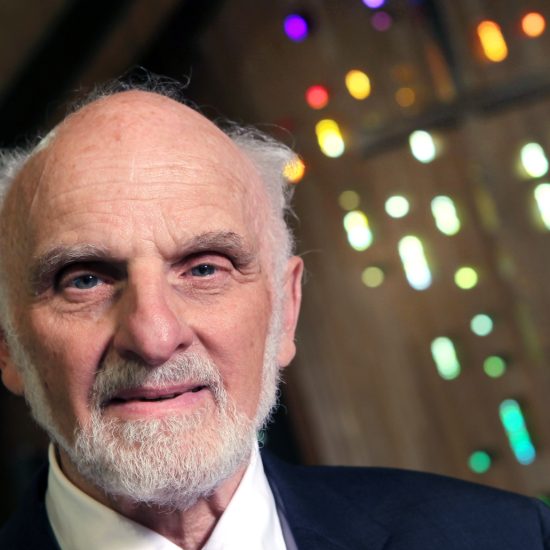
My entrée into social media as something other than a space to share pictures of my life began as a class assignment in a divinity school course on Proclamation in the Digital Age. I (who was clear in my discernment that congregational ministry wasn’t going to be my thing but who also needed a space in which to say something about what I was learning) was excited to find a way around writing sermons while still getting to preach. Thus was born the Instagram account @definitelysometimes.

Lauren Graeber
In its early months, it hewed closely to my school work. A survey of the content reveals a lot of God-talk often tied to liturgy, biblical commentary, some light theological deconstruction. Then COVID-19 lockdowns did what they do – upended everything, including a clear plan for how the digital community I’d built would factor into my now in-revision career plans.
Since then the account has been a lot of things: a pandemic journal, a space to publicly and poorly, I’ll admit, hold myself to account on issues of racial and climate justice, a marketplace for my embroidery hobby, an easy audience for the writing I carry around in my head. And every once in a while, still, it’s where I proclaim my faith.
But here’s the thing I’ve noticed, the pattern in my own behavior not only on Instagram but in the workshops I lead on writing as a spiritual practice: I’m not talking about God as much. Well, I am, but not by name.
Not that I was ever intentionally making sure God got some mentions on the regular. I don’t think I ever included a #Jesus, but early on I was firmly grounded in the language of the Christian tradition even as I worked to stretch into its margins. These days I could be (and I have been) accused of not showing due deference to the Lord’s name.
My first instinct was to worry about this, my second was to justify it, my third was to wonder about it. Because my worries are best placed in those who best love me, let us jump to justification.
Among the most well-worn handouts from my theology class are the front and back, multi-columned pages of biblical names for God. I have used this stunning list of titles, metaphors, and exclamations of God’s works many times with folks who are in some way searching for a new or deeper way to connect with the Creator. That need may be rooted in hurt or exhaustion or a deep longing – often all of that.
My personal choice to call God “Love” rather than “Lord” is rooted in a theological framework that doesn’t center power in the I-Thou relationship. My professional choice to use Love (or Spirit, sometimes The Divine, occasionally Reality) is an act of pastoral care for the particular folks who find me and who are looking for a new way through their faith and who need new roads on their journeys.
What the handout of biblical names for God reminds us is that our tradition isn’t nearly as restrictive or limited as we might have been told. To add to the biblical list a mere dip into our contemplative and mystical traditions affirms that those who have encountered the Divine often walk away with altogether new images, titles, and understandings of God.
Also, if you’ve seen the Episcopal Church’s newly published national survey Jesus in America then a move to create distance between my digital identity and the Christian tradition makes sense. According to the survey, while Christians think of themselves as “giving, compassionate, loving, respectful and friendly,” non-Christians associate us with “hypocrisy, being judgmental, self-righteousness and arrogance.” Furthermore, very few Americans report that the Christians they know represent the values and teachings of Jesus. Yikes.
@definitelysometimes was built on the hunch that whatever form my ministry took, it was going to be among people whose faith (if they professed one) was punctuated by question marks. Increasingly it has felt – and the data seems to bear this out – that using explicitly Christian language is a barrier to inviting folks to engage with God.
Here, then, is where the wonder kicks in.

Karsten Winegeart / Unsplash
I don’t talk about Love as some bait and switch to seed the ground for a future talk on salvation, but neither am I a closet Christian. This isn’t an issue of me not being able to practice my faith in the public square; it’s a choice not to. And no, not out of shame for the gospel, but instead out of a deep love for people for whom the presentation of the gospel has been piss poor and who now feel abandoned by God. I suspect I’m not alone in this linguistic habit. How quickly has your tongue lurched to say “I’m not one of those Christians!”?
What are we to do, those of us still tethered to Jesus out floating in the detritus of Christianity’s reputation? Who I am even to worry about God’s reputation? I’m not convinced this isn’t more about the institution than the Source.
Does God even need mentions? When I stop the family to point out the sunrise, do I need to #God that moment for us? For my followers on Instagram? Are our awe and gratitude enough?
There is a piece of this that is peculiar to our time, which made it necessary for my theological training to be tailored for a social media universe. One of the things I miss most about my time in that class and others was that I was privy to the thoughtful considerations of other Christians with hearts for people I didn’t see and issues I couldn’t fathom. I long for their wisdom now. I’m genuinely curious what I haven’t wondered about yet.
One good answer from a Good Book is to go humbly through your life doing your darn best to follow the teachings of Jesus. Micah 6:8 your way through. Lord, we now walk in the digital age, and, of course, we’re as human as ever. How do we proclaim your Love in that space?
Lauren Graeber is a writer, teacher of writing workshops, and Co-Director of the Center for Prayer and Spirituality at St. Mary’s Episcopal Church in High Point, North Carolina. She navigates faith, parenting, and questions that delightfully refuse to be answered on IG @definitelysometimes.






